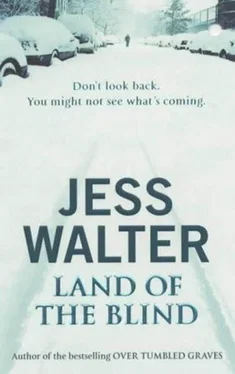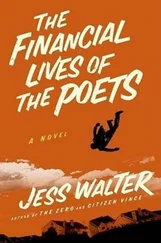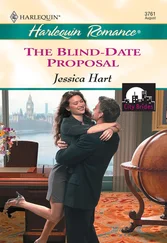Jess Walter - Land Of The Blind
Здесь есть возможность читать онлайн «Jess Walter - Land Of The Blind» весь текст электронной книги совершенно бесплатно (целиком полную версию без сокращений). В некоторых случаях можно слушать аудио, скачать через торрент в формате fb2 и присутствует краткое содержание. Жанр: Детектив, на английском языке. Описание произведения, (предисловие) а так же отзывы посетителей доступны на портале библиотеки ЛибКат.
- Название:Land Of The Blind
- Автор:
- Жанр:
- Год:неизвестен
- ISBN:нет данных
- Рейтинг книги:3 / 5. Голосов: 1
-
Избранное:Добавить в избранное
- Отзывы:
-
Ваша оценка:
- 60
- 1
- 2
- 3
- 4
- 5
Land Of The Blind: краткое содержание, описание и аннотация
Предлагаем к чтению аннотацию, описание, краткое содержание или предисловие (зависит от того, что написал сам автор книги «Land Of The Blind»). Если вы не нашли необходимую информацию о книге — напишите в комментариях, мы постараемся отыскать её.
Land Of The Blind — читать онлайн бесплатно полную книгу (весь текст) целиком
Ниже представлен текст книги, разбитый по страницам. Система сохранения места последней прочитанной страницы, позволяет с удобством читать онлайн бесплатно книгу «Land Of The Blind», без необходимости каждый раз заново искать на чём Вы остановились. Поставьте закладку, и сможете в любой момент перейти на страницу, на которой закончили чтение.
Интервал:
Закладка:
It was around this time that Eli started pulling back, too. What had once been a campaign focused around the two of us was now a huge machine with me at the center and several layers of publicity and press and strategy people between Eli and me, not to mention my new wife, a self-centered snob who'd gone to high school with Eli and who still had no use for him. Eli sightings became scarce around the campaign, and to my deep shame, I did nothing to bring him back into the fold.
And so it was that by the summer of 2000, with the election only months away, I found myself in the troubling position of having done exactly the opposite of what I'd set out to do, what the young visionary Kayla advised me that morning while she ate breakfast: Go back to yourself
Instead I chased the weakened version of an expired daydream, formless and without meaning. I became a politician. For someone allegedly seeking self-awareness and redemption, it would have made more sense to have my soul surgically removed and replaced with chipped beef.
I knew I was betraying myself in some fundamental way, but my addiction was in full bloom; I couldn't stop. I became more depressed and scattered as the campaign wore on. I butchered a swing through the small farm towns of the Palouse, south of Spokane. (At the Colfax library I was supposed to deliver the line "It's time to get government off the backs of the small farmer," but what came out of my mouth was somewhat
"What's the matter with you?" Dr. Stanton asked me. "You actually have a shot here." After that, he bowed out of rural campaign swings with me; he worried that he was making me nervous. But I screwed up when he wasn't with me, too, and at one stop I called George N- "a chinless dickball, an ethics-challenged, steaming bowl of fuck."
Dr. Stanton was irate. He said that if the media had happened to be at that event the campaign would be over. He asked if my verbal slips were caused by problems at home. "A campaign is tough on a young couple, especially if you've just gotten married. Why don't I talk to her? You want me to talk to her?"
"No," I said. "That's nice of you, but it's not her." And still, Dr. Stanton was a good enough friend to realize that my marriage was part of the problem, although I don't think he understood the larger problem. Just as Ben had foreseen, my weakness had finally played itself out; I had turned myself over completely to the perceptions of others, the voters, members of various country clubs and organizations, my campaign staff, the media covering the race, the state party, everyone but myself. And these verbal mistakes, these Tourettic slips of tongue, were my real self trying to get out.
But the more successful Tony Mason the candidate became, the further Clark Mason receded into the background, until one day in September, seven weeks before the election. I was sitting on the couch in our house, staring at furniture that my wife had chosen for us from catalogs and stores in Seattle. I looked down and saw that I was wearing clothes that a campaign consultant had chosen, sitting on a couch I'd never seen until it showed up in a living room that someone else had decorated.
"Tony?" my wife said from the kitchen. "Can we go somewhere warm for vacation after the election?"
"Sure," said Tony. "We can go wherever you want." And just like that, Clark Mason was officially dead.
As I said, this is ultimately a story about a fall, and that is what happened in that autumn of 2000. So as not to clutter this up further with my emotional state, I'll draw on the cold organizational skills of my legal background to tell you what happened. And so I hereby duly report the following: that within a six-day period in October 2000, these events did occur in the City of Spokane, County of Spokane, Washington State:
I. I met with my accountant and was apprised of the following:
A. Despite his repeated and unheeded warnings – something about all my eggs and one (1) basket – my entire portfolio consisted of emerging technology stocks.
B. The bubble had officially burst and technology stocks were down some 200 percent. My particular stocks were down even more. A full third of the companies that I owned no longer even existed.
C. I could try to redirect my investments, but I had spent too freely on the campaign, my house, my wedding, and countless other things.
D. I was broke.
II. I met with the state Democratic Party chairman, who informed me:
A. The party was impressed with my showing, but projections showed that I couldn't win.
B. They were worried about rumors that my campaign was partly funded by unwitting investors of a shadow company called Empire.
C. The party wasn't inclined to spend any more money on the campaign.
D. I was fucked.
III. Upset about these developments, I came home unexpectedly after canceling a campaign appearance and found:
A. My wife lying naked on the bed, reading a book.
B. Another man's pants lying next to the bed.
C. Said man in my shower. (In hindsight, I wish I'd bothered to find out whose pants were on my floor and, more important, what sort of range stud could drive my pinhead wife to such heights of ecstasy that she actually wanted to read a book. But I needed to get out of there, so I walked out of the house and didn't stop until I was downtown, standing in front of the Davenport Hotel, of all places.)
D. I was alone.
Unraveling can make one of two sounds: the long sigh of a balloon losing its air, or the dull flapping of a tire blowing out on the highway. An unraveling candidate makes both these noises, and nothing can be harder than to put back together a candidate who has come apart. I kept campaigning after the collapse – I couldn't think of what else to do – but it was over. My paid staff left when they were no longer actually paid, all except the loyal Dr. Stanton. I'm still touched by the way he kept apologizing for everything that happened, as if he could've done something to stop the deflation.
Like any wounded animal, when the last blow came, I found it a relief. It happened at the end of October. I was at the hotel where I'd recently moved, watching late-night TV, when I saw the ad: a picture of me from several years earlier, when I still had long hair and the eye patch. I didn't remember choosing that particular picture for an ad, and I was surprised that my formerly high-paid staff would allow it. Then the voice-over: "Until a year ago, Clark Mason" – I sat up at the mention of my real name – "was a rich Seattle attorney. Do we really want a liberal, rich west-side lawyer representing eastern Washington in Congress? Do we trust Seattle to take care of Spokane?"
My first thought was fairly detached: Now that is an effective piece of advertising. There were three such ads, all with the same theme and the same deep, movie-preview voice-over. They seemed to run every six or seven minutes on various channels. If there had been any hope for a last-minute reversal, that series of ads certainly took care of it.
A few days later, I read in the newspaper that the ads had been paid for by a political action committee called the Fair Election Fund, and that the officers of this fund were my friends Louis Carver and Eli Boyle. Louis called me immediately and said that he'd known nothing about it until he read it in the paper that morning; Eli's paranoia and delusions, he said, were getting out of control. I told Louis that it was okay, and that he should forgive Eli, that Eli needed him.
Later that day I talked to the press, halfheartedly defending myself against the charges that I was a carpetbagger. "One thing I can tell you, I'm certainly not a rich Seattle lawyer anymore," I said. I liked that joke – it was the first thing I'd written for the campaign in a while – but I think it came off sounding self-pitying and arch.
Читать дальшеИнтервал:
Закладка:
Похожие книги на «Land Of The Blind»
Представляем Вашему вниманию похожие книги на «Land Of The Blind» списком для выбора. Мы отобрали схожую по названию и смыслу литературу в надежде предоставить читателям больше вариантов отыскать новые, интересные, ещё непрочитанные произведения.
Обсуждение, отзывы о книге «Land Of The Blind» и просто собственные мнения читателей. Оставьте ваши комментарии, напишите, что Вы думаете о произведении, его смысле или главных героях. Укажите что конкретно понравилось, а что нет, и почему Вы так считаете.











